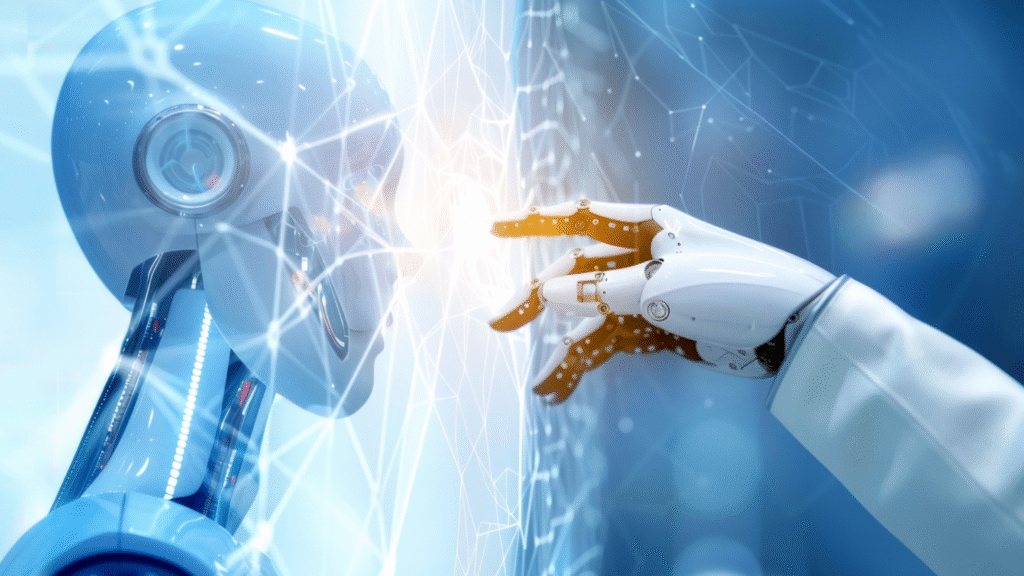written by “Jake Mannino”
As we stand at the crossroads of rapid technological evolution, the landscape of leadership is undergoing a profound transformation. Artificial intelligence (AI), automation, and other advanced technologies are reshaping industries, businesses, and the very nature of work itself. In this ever-evolving environment, the role of human leadership is not being diminished, but rather redefined. The leaders of tomorrow will need to navigate the complexities of a tech-driven world while staying true to the core elements that make leadership inherently human.
This blog explores how human leadership will adapt and evolve in the future, driven by AI and technological advancements, and what skills and qualities will be essential for leaders to thrive in this new era.
1. Redefining Leadership: The Human-AI Partnership
In the past, leadership was centered around decision-making, managing teams, and guiding organizations based on a combination of experience, intuition, and data. While these aspects will remain important, AI is poised to take over many data-driven, routine decision-making tasks. AI systems can analyze massive datasets in real-time, provide insights that humans might miss, and automate processes that traditionally required human oversight.
However, this doesn’t mean that leaders will be replaced. Instead, leadership will become a partnership between humans and AI. The future leader will need to harness AI’s analytical capabilities while retaining and amplifying distinctly human qualities like emotional intelligence, creativity, and ethical decision-making. AI will augment human decision-making, providing leaders with deeper insights and more data-driven strategies, but the human element will remain crucial in interpreting these insights and aligning them with an organization’s vision and values.
2. Empathy and Emotional Intelligence: Leadership’s Critical Edge
As AI and automation take over more technical and repetitive tasks, human qualities such as empathy, emotional intelligence, and interpersonal skills will become even more critical in leadership. Machines, for all their computational power, cannot replicate the nuanced understanding of human emotions, motivations, and the ability to foster trust within teams.
Future leaders will need to place a heightened focus on empathy—not just as a soft skill, but as a fundamental leadership competency. Building strong relationships, understanding diverse perspectives, and motivating individuals through emotional connection will distinguish human leaders from their AI-driven counterparts. In a future where much of the operational work can be delegated to machines, leaders who excel in managing the human aspects of work—fostering creativity, collaboration, and a sense of purpose—will stand out.
3. Ethical Leadership in a Tech-Driven World
One of the most significant challenges for future leaders will be navigating the ethical implications of AI and technological advancements. As organizations increasingly rely on AI to make decisions that affect employees, customers, and society at large, leaders will need to be vigilant about the ethical dimensions of these technologies. Issues such as bias in AI algorithms, data privacy, and the potential displacement of jobs will require leaders to take a thoughtful and principled approach.
Leaders of tomorrow must champion transparency, accountability, and fairness in how AI is deployed. They will need to advocate for ethical AI frameworks and policies that balance innovation with social responsibility. The future of leadership will demand a keen understanding of not only how technology works, but also how it should be used to benefit humanity.
4. The Rise of Digital Leadership: Leading Distributed and Virtual Teams
The rapid adoption of digital tools and platforms has already transformed the way leaders manage teams. The COVID-19 pandemic accelerated the trend towards remote work, and it’s clear that distributed, virtual teams will be a permanent fixture in many industries. In the future, leaders will need to be proficient in digital leadership—effectively managing teams that are geographically dispersed and reliant on technology for communication and collaboration.
Leaders will need to master new digital platforms, create cultures of inclusivity in virtual settings, and ensure that communication remains transparent and effective across various channels. Leading in a digital-first world requires a shift from traditional face-to-face management to leadership that is adaptable, flexible, and tech-savvy. The ability to maintain human connection, foster teamwork, and build trust in a virtual environment will be crucial.
5. Lifelong Learning and Agility: The New Leadership Mandate
The future of leadership will demand continuous learning and adaptability. The pace of technological change is so rapid that the skills required to lead today may become obsolete in just a few years. Leaders will need to be agile learners, constantly updating their knowledge and skills to stay ahead of industry trends and technological innovations.
This mindset of lifelong learning will extend beyond technical skills. As AI and automation reshape industries, leaders will need to be comfortable with uncertainty and change, demonstrating agility in their approach to challenges. They will need to model this adaptability for their teams, creating cultures of learning and innovation that encourage employees to embrace change and continuously improve.
6. Fostering Innovation in a Tech-Driven Future
One of the core responsibilities of future leaders will be fostering innovation. With AI and technology advancing at breakneck speed, the capacity for innovation will define the success of organizations. However, while AI can assist in generating new ideas, predicting trends, and automating processes, it is the human capacity for creativity and forward-thinking that will drive true innovation.
Leaders must cultivate environments that encourage creative problem-solving and out-of-the-box thinking. They should support diverse teams and inclusive workplaces, where different perspectives are valued, as diversity is a key driver of innovation. Moreover, leaders should create safe spaces for experimentation, where failure is seen as a learning opportunity rather than a setback.
7. Future-Proofing Leadership: Skills to Cultivate
To prepare for the future of leadership in an AI-driven world, there are several skills that today’s leaders must begin cultivating:
- Tech Literacy: Leaders don’t need to be AI experts, but they must have a solid understanding of how AI and other technologies work, how they are integrated into business processes, and the ethical considerations they bring.
- Adaptability: The ability to pivot quickly in response to new information, trends, or disruptions will be essential. Leaders must be agile and open to rethinking strategies and approaches.
- Cultural Competence: As global teams and markets expand, leaders need to be adept at leading across cultural boundaries and understanding diverse perspectives.
- Ethical Judgment: The capacity to make sound, ethical decisions in a landscape that is increasingly driven by AI will set great leaders apart.
- Emotional Intelligence: The ability to connect with and inspire people on a personal level will continue to be a key differentiator for leaders.
Conclusion: Human Leadership in a Technological World
AI and technological advancements are transforming industries and redefining the role of leadership. However, rather than replacing human leaders, these technologies are creating new opportunities for leaders to excel by focusing on what makes them uniquely human: empathy, creativity, ethical decision-making, and the ability to inspire and connect with others.
The future of leadership will be about balancing technological tools with human intuition, leading with both data and heart, and navigating the ethical complexities that arise in a tech-driven world. As AI takes on more operational tasks, human leaders will be free to focus on what matters most—empowering their teams, fostering innovation, and driving organizational success in an ever-changing landscape.
how leadership is adapting to the integration of AI and technological advancements:
Example : Microsoft’s Use of AI to Enhance Human Leadership
Microsoft’s adoption of AI across its business operations exemplifies how human leadership can be enhanced by technology rather than replaced. In particular, Microsoft’s AI-driven tools, such as Azure AI and Power BI, provide leaders with real-time data analysis and insights, enabling them to make faster, more informed decisions.
For example, Microsoft’s AI platforms allow leaders to understand employee productivity trends, customer feedback, and operational inefficiencies more comprehensively. Satya Nadella, Microsoft’s CEO, has emphasized the importance of “tech intensity”—the idea that leaders need to be both proficient in technology and continuously learning to keep pace with change. However, Nadella also stresses that technology alone is not enough; it is the human element—leadership, culture, and ethical responsibility—that drives real transformation.
Reference:
Nadella, S. (2019). Hit Refresh: The Quest to Rediscover Microsoft’s Soul and Imagine a Better Future for Everyone. HarperBusiness.
Happy Selling - Jake Mannino

